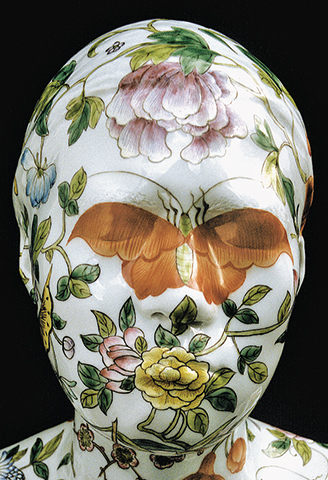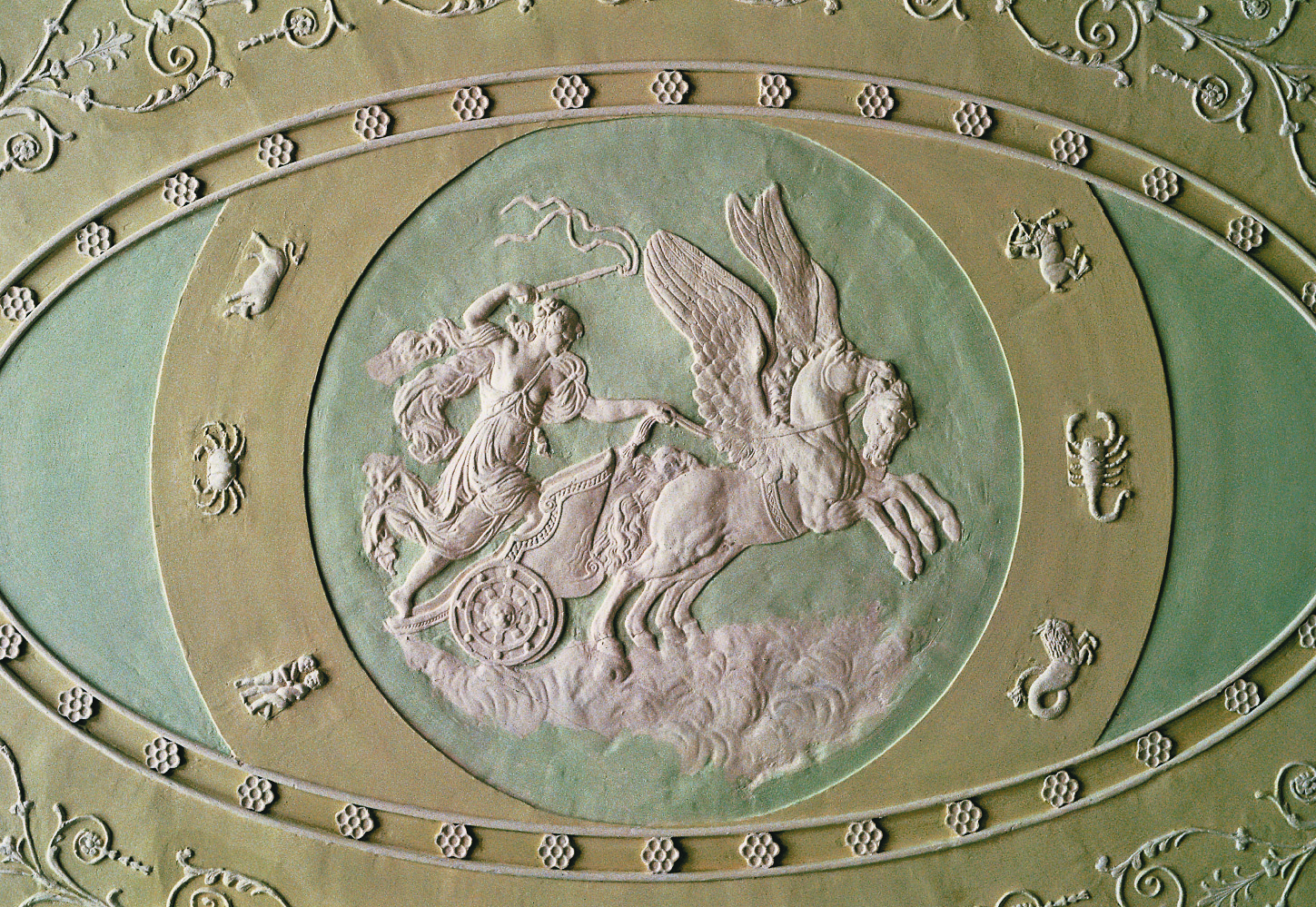3.2 The Soul Is Immortal: Socrates and Plato
Socrates* was the first thinker in Western history to focus the full power of reason on the human self: who we are, who we should be, and who we will become. Socrates was convinced that, in addition to our physical bodies, each person possesses an immortal soul that survives beyond the death of the body. He explored this subject with his friends in the days following his trial and before his sentence of death was executed, a time in his life when the question of immortality no doubt had a special immediacy and significance. The following passage is from Plato’s* dialogue, Phaedo.

Who are you?
In China, China, artist Ah Xian has layered images from traditional Chinese porcelains onto the bust of a contemporary Chinese woman. The work vividly communicates an idea about the relationship between culture and the self. How is your culture reflected in the person you are?
This brief exchange provides a cogent summary of Socrates’s metaphysical framework. For Socrates, reality is dualistic, made up of two dichotomous realms. One realm is changeable, transient, and imperfect, whereas the other realm is unchanging, eternal, immortal. The physical world in which we live—comprising all that we can see, hear, taste, smell, and feel—belongs to the former realm. All aspects of our physical world are continually changing, transforming, disappearing.
In contrast, the unchanging, eternal, perfect realm includes the intellectual essences of the universe, concepts such as truth, goodness, and beauty. We find examples of these ideal forms in the physical world—for example, we might describe someone as truthful, good, or beautiful. But these examples are always imperfect and limited: It is only the ideal forms themselves that are perfect, unchanging, and eternal.
Socrates’s metaphysical scheme may, at first glance, seem abstract and impractical, but it has a profound impact on the way the self is understood. For Socrates, our bodies belong to the physical realm: They change, they’re imperfect, they die. Our souls, however, belong to the ideal realm: They are unchanging and immortal, surviving the death of the body. And although a close relationship exists between our souls and our bodies, they are radically different entities. Our souls strive for wisdom and perfection, and reason is the soul’s tool to achieve this exalted state. But as long as the soul is tied to the body, this quest for wisdom is inhibited by the imperfection of the physical realm, as the soul is “dragged by the body into the region of the changeable,” where it “wanders and is confused” in a world that “spins round her, and she is like a drunkard.” But reason is a powerful tool, enabling the soul to free itself from the corrupting imperfection of the physical realm and achieve “communion with the unchanging.”
What is truly remarkable about these ideas is how closely they parallel modern Western consciousness. A finite body; an immortal soul; a perfect, eternal realm with which the soul seeks communion and eternal bliss: All of the basic elements of Western (and some Eastern) religions are present. Even on a secular level, the ideas resonate with modern concepts of the self: The notion that the thinking, reasoning self and the physical body are radically distinct entities that have a complicated and problematic relationship with one another.
Having described his overall metaphysical vision, Socrates goes on to elaborate his ideas and argue for their plausibility.
Although Plato was for the most part committed to Socrates’s view of the essence of the self—the soul—as a unified, indissoluble, immortal entity that remains the same over time, he also recognizes the inherent difficulties with this view. In his dialogue The Symposium, Plato cites the views of the female philosopher Diotima, who presents a very different perspective on the nature of the self:
Although we speak of an individual as being the same so long as he continues to exist in the same form, and therefore assume that a man is the same person in his old age as in his infancy, yet although we call him the same, every bit of him is different, and every day he is becoming a new man, while the old man is ceasing to exist, as you can see from his hair, his flesh, his bones, his blood, and all the rest of his body. And not only his body, for the same thing happens to his soul. And neither his manners, nor his dispositions, nor his thoughts, nor his desires, nor his pleasures, nor his sufferings, nor his fears are the same throughout his life, for some of them grow, while others disappear. . . . Thus, unlike the gods, a mortal creature cannot remain the same throughout eternity; it can only leave behind new life to fill the vacancy that is left as it passes away. . . . And so it is no wonder that every creature prizes its own offspring, since everything is inspired by this love, this passion for immortality.
Plato’s description of Diotima’s position penetrates to the core of the problem of personal identity. How is it possible to say that a self remains the same when it is obvious that every self is defined by a process of continual change and evolution? This is visibly apparent in our physical bodies, and contemporary science has revealed that, even on the cellular level, old cells are dying and being replaced by new cells on an ongoing basis. In what sense can we say that an infant at the age of six months is the same person at the age of sixty years, when so much of his or her physical body has changed? And Diotima astutely points out that this same process of continual growth and evolution also defines your “soul.” It is analogous to completely renovating an old house, gradually replacing every part of it over time: At what point does it lose its “original” identity and become a “new” house? For Diotima, this dynamic, changing quality of the soul leads her to a very different conclusion than Plato’s: Unlike the gods, the human soul is not immortal, though we fervently want it to be. And it is this doomed passion for immortality that inspires the “prizing” of our children. They will become our living legacy as we “leave behind new life to fill the vacancy that is left as it passes away.”
Who Was Michael Jackson?
Reading Critically
Analyzing Socrates on the Self
Compare Socrates’s concept of the “soul” with your concept of the self, which you described in the “Thinking Philosophically” activity. Did you view your self as a unified identity that remains the same over time? An indissoluble entity that is immortal and will survive death? An entity that is very different in kind from your physical body? An entity that strives to achieve communion with some ultimate reality?
In characterizing the relationship between the soul and the body, Socrates explains that the soul uses the body as “an instrument of perception,” and that the soul “rules” the body in the same way that the divine rules the mortals. Do you agree with this analysis? Why or why not? How would you characterize the relationship between your soul/self and your body?
Socrates argues that because the soul is of a unified, indissoluble form we should not be concerned about death because the soul is incapable of being dispersed into nonexistence—it must be eternal. Does this argument address your fears about the potential death of your soul/self? Why or why not?
For Socrates, our physical existence on Earth is merely an imperfect reflection of ultimate and eternal reality, and our purpose in life is to achieve communion with this ultimate reality. How do his views compare with your perspective on the purpose of life? Do you believe that our goal in life is to achieve spiritual transcendence and/or intellectual enlightenment? If not, what do you believe is the purpose of your life?
Plato elaborates his concept of the soul (the Greek word is psyche) in his later dialogues such as the monumental Republic and Phaedrus. In particular, he introduces the idea of a three-part soul/self constituted by
Reason—Our divine essence that enables us to think deeply, make wise choices, and achieve a true understanding of eternal truths.
Physical Appetite—Our basic biological needs such as hunger, thirst, and sexual desire.
Spirit or Passion—Our basic emotions such as love, anger, ambition, aggressiveness, empathy.
These three elements of our selves are in a dynamic relationship with one another, sometimes working in concert, sometimes in bitter conflict. For example, we may develop a romantic relationship with someone who is an intellectual companion (Reason), with whom we are passionately in love (Spirit), and whom we find sexually attractive, igniting our lustful desires (Appetite). Or we may find ourselves in personal conflict, torn between three different relationships, each of which appeals to a different part of our self: Reason, Spirit, Appetite. When conflict occurs, Plato believes it is the responsibility of our Reason to sort things out and exert control, reestablishing a harmonious relationship among the three elements of our selves.
Plato illustrates his view of the soul/self in Phaedrus with a vivid metaphor: The soul is likened to a chariot drawn by two powerful winged horses—a noble horse, representing Spirit, and a wild horse, embodying Appetite. The charioteer is Reason, whose task is to guide the chariot to the eternal realm by controlling the two independent-minded horses. Those charioteers who are successful in setting a true course and ensuring that the two steeds work together in harmonious unity achieve true wisdom and banquet with the gods. However, those charioteers who are unable to control their horses and keep their chariot on track are destined to experience personal, intellectual, and spiritual failure. The fact that the horses are “winged” suggests the capacity of the soul to soar to the elevated realm of wisdom and intellectual enlightenment. These are themes that we will explore more fully in Chapter 4 when we deal with the subjects of human nature and personal freedom and in Chapter 5 when we explore the nature of truth and reality.

The chariot analogy.
Plato says, “We will liken the soul to the composite nature of a pair of winged horses and a charioteer.” One horse represents Passion, the other Appetite, and the charioteer who tries to control them is Reason. Do you find this to be a useful metaphor for understanding your self? Why or why not?
Plato believed that genuine happiness can only be achieved by people who consistently make sure that their Reason is in control of their Spirits and Appetites. This harmonious integration under the control of Reason is the essence of Plato’s concept of justice, both at the individual level and, as we shall see in Chapter 10, at the social and political level as well.
Reading Critically
Analyzing the Chariot Analogy
Describe an incident in your life in which you experienced a vigorous conflict between the three dimensions of your self identified by Plato: Reason, Appetite, and Spirit. What was the nature of the conflict? How was it resolved?
Describe an experience in your life in which Reason prevailed over Passion and Appetite. How was Reason able to prevail? Did you gain increased wisdom from the experience?
Describe an experience in your life in which the three elements of your self identified by Plato worked together in a productive and harmonious fashion, enabling you to achieve a great success.